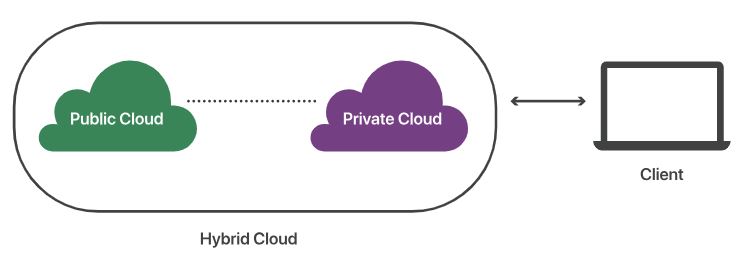Cloud Computing - Hybrid Model
Cloud deployment models describe how cloud computing resources and services are hosted, managed, and made available to users and organizations. It simply refers to delivering computing resources, such as servers, storage, databases, software, and applications, over the Internet.
3. Hybrid Cloud
Hybrid cloud is a computing environment that combines elements of both public and private clouds, allowing data and applications to be shared between them.
Hybrid cloud = public cloud + private cloud
a hybrid cloud is used in finance, healthcare, and Universities. The best hybrid cloud provider companies are Amazon, Microsoft, Google, Cisco, and NetApp.

Advantages of Hybrid Cloud
Here are some key characteristics and aspects of hybrid cloud.
- Public Cloud - This is a cloud computing model where services and resources are provided by third-party cloud service providers and are accessible over the internet. Public clouds are often used for scalable and cost-effective storage and compute resources.
- Private Cloud - A private cloud is typically hosted within an organization's own data centers or on dedicated infrastructure. It offers greater control, security, and customization but can be more expensive to set up and maintain.
- Integration - The key feature of a hybrid cloud is the integration between public and private clouds. This integration is facilitated by a combination of technologies, such as virtual private networks (VPNs), dedicated connections, and hybrid cloud management platforms.
- Data and Application Portability - In a hybrid cloud, data and applications can move between the public and private clouds seamlessly. This allows organizations to take advantage of the scalability of the public cloud while keeping sensitive or critical workloads in a private cloud for added security.
- Resource Optimization - Hybrid cloud allows organizations to optimize their IT resources. They can use public cloud resources to handle spikes in demand while maintaining a private cloud for steady-state workloads.
- Security and Compliance - Hybrid cloud deployments can be tailored to meet specific security and compliance requirements. Sensitive data can be stored and processed in the private cloud, while less sensitive data can reside in the public cloud.
- Cost Management - Organizations can achieve cost savings by using public cloud resources only when needed and relying on private cloud resources for predictable workloads. This cost flexibility is often referred to as "cloud bursting."
- Disaster Recovery - Hybrid cloud provides an effective disaster recovery solution. Data and applications can be replicated to the public cloud for backup and recovery purposes, ensuring business continuity in case of a disaster.
- Flexibility - Organizations have the flexibility to choose the right cloud model for each application or workload, depending on factors like performance, scalability, and security requirements.
Disadvantages of Hybrid Cloud
Hybrid cloud have following disadvantage also.
- Networking issues - In the Hybrid Cloud, networking becomes complex because of the private and the public cloud.
- Infrastructure Compatibility - Infrastructure compatibility is the major issue in a hybrid cloud. With dual-levels of infrastructure, a private cloud controls the company, and a public cloud does not, so there is a possibility that they are running in separate stacks.
- Reliability - The reliability of the services depends on cloud service providers.
Next
